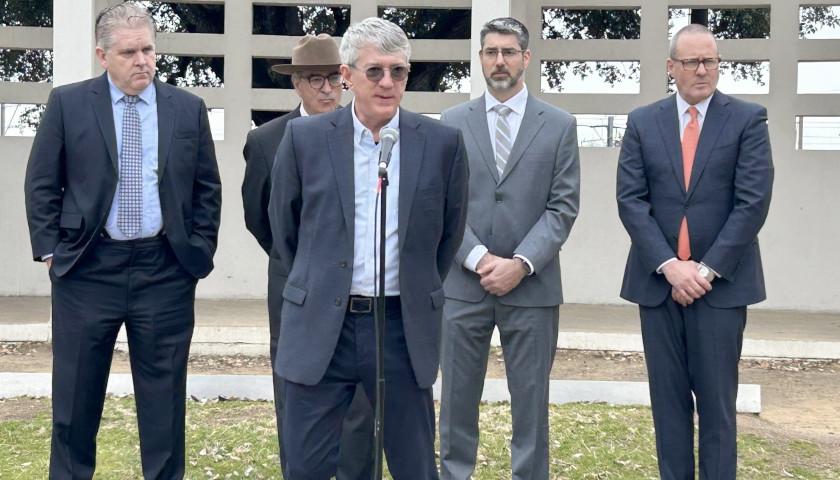Live from Music Row Thursday morning on The Tennessee Star Report with Michael Patrick Leahy – broadcast on Nashville’s Talk Radio 98.3 and 1510 WLAC weekdays from 5:00 a.m. to 8:00 a.m. – host Leahy welcomed Congressman Scott Cepicky to the studio to discuss his recent bill called the Teacher’s Discipline Act and how it gives teacher’s the ability to remove disruptive students from the classroom that interfere with learning.
Leahy: We are with State Representative Scott Cepicky from Maury County. Well, now we’re going to talk a little bit about the bills that you are carrying this session. Tell us about the 10 bills you’re carrying.
Cepicky: (Chuckles) Just next week.
Leahy: Just next week. Just tell us to start off with some of the important ones that you are carrying and how that came about.
Cepicky: We have a very, very important bill that will be substituting and conforming that the Senate’s already passed which is the Teacher’s Discipline Act. What it does is it gives our teachers the ability to remove a repetitively, a disruptive student from their classrooms.
Leahy: That’s a great idea. They can’t do that now.
Cepicky: No.
Leahy: Really? Why not?
Cepicky: We don’t have the ability for them to be protected in code. so they can try, but the way the system is set up right now, there are penalties for LEAs, local school systems that if they remove it…
Leahy: LEA is Local Education Authority authority, which is what most school systems are. We have like 141 of them in Tennessee.
Cepicky: 147. I better know the answer because I’m on the education committee.
Leahy: You got me on that one.
Cepicky: We have a problem in Tennesee and you’ve seen the videos where a child just has an episode and it stops the classroom. And what the teacher does is they pull all the other kids out of the classroom into the hallway and they stand there for two hours while the kid just destroys the classroom and tries to calm themselves down. Now, one would argue there’s probably an issue there with that child.
Leahy: I would guess.
Cepicky: We need to get the interventionists in there to find out we have a behavioral or mental health issue and address those issues. But we have to get to a point where that teacher has to have the ability to maintain the discipline in their classroom so those other 29 kids can get their education. We struggle right now in Tennessee with the literacy rate in third grade. Do you know what it is in eighth?
Leahy: Not much better.
Cepicky: 28.
Leahy: Worse.
Cepicky: 28.
Leahy: When you say literacy, reading at grade levels? Is that what you are talking about?
Cepicky: Yeah, it drops in 28 the. Do you believe there’s any magic time that they all automatically just learn how to read after eighth grade when it’s 28 percent? it doesn’t happen.
Leahy: It’s got to happen by K thru three, four, and five right?
Cepicky: The gateways third grade. And so the Teachers Discipline Act we will hopefully we will substitute and conform, have no problems there that will go to the governor staff for signature.
Leahy: And do you anticipate the governor will sign it?
Cepicky: I hope so. I hope he’s listening because I really hope he signs it because it’s another mechanism that we can put in place. A process that not only protects the students that may have a mental health issue or behavioral issue, but it gives the teachers and those other kids in the classroom the opportunity to succeed.
Leahy: Common sense.
Cepicky: Common sense. We have other bills with mental health, helping our teachers get trained not to get in the intervention of mental health with our children, but to look at and maybe identify it.
Leahy: Identify it. And Maybe move them into a situation where they can be treated.
Cepicky: You got it.
Leahy: That makes a lot of sense as well.
Cepicky: We have other bills where we’re looking at the Textbook Commission giving them more authority.
Leahy: The Textbook Commission
Cepicky: Giving them more authority.
Leahy: Controversial to a degree.
Cepicky: It is. But it’s very important on who you put on there. You have to look at the standards we have in Tennessee and look at the textbooks that are being provided by the publishers. And their job is to make sure that they align to our standards 100 percent. We just passed the bill with the special session we had with the governor on literacy.
That one of the problems we have and had and we’ve rectified that with who now approves waivers in Tennessee. But instead of the Commissioner of Education giving waivers for textbooks, it’s now the State Board of Education. And we put in the literacy bill that after January first of 2023, there will be no more waivers for textbooks that do not align to our standards in Tennessee.
Leahy: So I’ll put a self-promoting plug here for The Tennessee Star.
Cepicky: Sure.
Leahy: As you know, we do, the National Constitution be here. We’re doing our fifth year in October. And kids win prizes. 10,000 dollars of educational scholarship to the winner. 5000 for second place, 2 500 third place. We use a book that I was a co-author of Guide to the Constitution and the Bill of Rights for Secondary School students. They like it. We sent it up to the University of Wisconsin Center for the Study of American Constitution to fact-check it. They fact checked it. So you’re a Badger. So we would love to see that as a supplementary text that schools could use. Just bringing that up here.
Cepicky: I hear you. So other bills we’ve had that in line, just what you said. One of the problems we have and you’ve seen this probably come across your desk at times of things that find their way into a classroom.
Leahy: Yes. Things that we would say, how did this get there?
Cepicky: They don’t align to Tennessee standards or values.
Leahy: There you go.
Cepicky: Terry Lynn Weaver and another representative.
Leahy: I know her very well, by the way, the best rendition of the national anthem you can hear from Terri Lynn Weaver.
Cepicky: She’s probably 100 the best voice in the General Assembly
Leahy: By a long shot.
Cepicky: I am not a close second. But she’s running a bill on supplemental material and how it will be used in the classroom and must align to our standards.
Leahy: There you go.
Cepicky: If it doesn’t align to our standards and a local education authority knowingly allows it then the Commissioner of Education has BEP funds taken from them. We’re very serious about this.
Leahy: That’s another good common sense. How do some of these bills come to you?
Cepicky: Well, everybody thinks that lobbyists up there have this big influence, and they do have some. The departments have a big influence, and they have a little bit. Most of the bills that I carry in education, that’s where my main focus is education or other bills in criminal justice. Most of those bills, believe it or not, come from conversations with citizens in my district.
Leahy: So how can a citizen be most effective in presenting their thoughts to a state representative? What’s the most effective way to do that?
Cepicky: And here’s the best answer I can give you. It is my job to make myself available to my district.
Leahy: So you’re available?
Cepicky: I am. We do a thing in Columbia called First Fridays. I will be on the square on First Fridays and just having conversations with people.
Leahy: Where at the square?
Cepicky: Just on the square.
Leahy: You’re standing on the square. Come talk to me.
Cepicky: I’ll park my truck, and I’ll put my campaign signs out so they know its me.
Leahy: So the people that come up and talk to you?
Cepicky: Typically, it could be four or five in a couple of hours, and it’s been as much as probably 30 people. It just depends on what topic is hot right now, and they want to know what their representative is going to do to help or protect Tennessee.
Leahy: Do you ever have anybody who’s just giving you a hard time.
Cepicky: I have my friends from the left. (Leahy laughs) And that’s ok.
Leahy: Are they friendly or are they mean?
Cepicky: Some are friendly and some are… not friendly.
Leahy: Not so friendly. That’s a problem. That’s always been the case. It seems like it’s more the case these days.
Listen to the full second hour here:
– – –
Tune in weekdays from 5:00 – 8:00 a.m. to the Tennessee Star Report with Michael Patrick Leahy on Talk Radio 98.3 FM WLAC 1510. Listen online at iHeart Radio.




